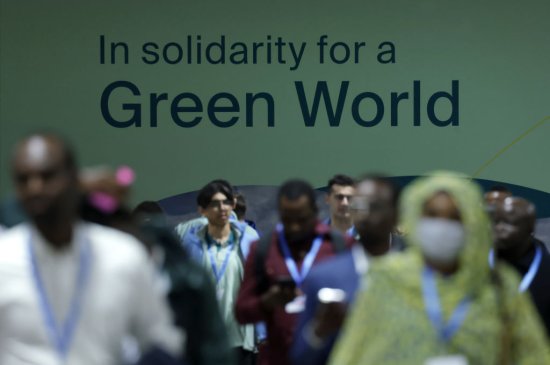
We can solve the climate challenge. But I also have to acknowledge my growing worry that I’m wrong, and the remaining steep obstacles ahead.
I’m a climate and water scientist. For more than 40 years, I’ve worked on trying to understand and communicate the complex climate threats facing the planet. In general, I’ve always been an optimist: I believe that we can solve these challenges. But I also have to acknowledge both my growing worry that I’m wrong, and the remaining steep obstacles in our path now made steeper by the recent U.S. election and the persistent failures of the world’s nations to commit to actions to adequately tackle the problem.
[time-brightcove not-tgx=”true”]The scientific facts of climate change and the role that humans play in driving those changes are irrefutable and have been understood and tested for literally decades—some of the earliest warnings about the adverse effects of burning fossil fuels on the climate and the planet were actually made more than 150 years ago.
Certainly, by the early 1980s, when I began work in this area, the risks were becoming clear. The U.S. House of Representatives Committee on Science and Technology commissioned a primer on climate change in 1976. The U.S. Senate Committee on Energy and Natural Resources held hearings in 1980 on the effects of carbon dioxide buildup in the atmosphere. That same year the JASON group, an independent body of scientists responsible for producing sensitive analyses for the U.S. energy, defense, and intelligence communities, publicly concluded “it seems highly probable that continued increases in the world-wide use of carbon-based fuels will lead to significant climatic shifts in the 21st Century.”
My own work on water resources predicted that continued emissions of climate pollutants would lead to dramatic changes in snowfall and snowmelt patterns, loss of soil moisture, changes in the timing of river runoff, and threats to water management. In 1989, my colleagues and I testified about the risks of climate change for California for the U.S. Senate Committee on Energy and Natural Resources. That committee included Senator Mitch McConnell, who, despite the clear science and early warnings, has since spent his long career delaying and blocking federal climate policies.
Even the fossil-fuel companies understood what they were doing, as internal research and memos show. James Black, then Exxon’s senior scientist, told a company top management committee in 1977 “there is general scientific agreement that the most likely manner in which mankind is influencing the global climate is through carbon dioxide release from the burning of fossil fuels.”
Yet the industry actively suppressed that research, while simultaneously secretly funding external groups to aggressively deny the science of climate change and sow doubt. These efforts have successfully provided cover for politicians to delay for decades the actions needed to phase out fossil fuels and expand non-carbon, climate-safe alternatives. Today, more fossil-fuel lobbyists than ever are attending and weakening the agreements at the annual U.N. climate summits, including the one just concluded in Baku.
We’re now experiencing the long-predicted consequences of that inaction and delay. Global temperatures are rising, extreme storms are worsening, food production and water supplies are threatened, and people are dying. And the economic and human impacts of even the relatively modest climate changes we’ve experienced so far are growing rapidly, with radical impacts hitting the insurance, real estate, and food sectors.
It seems there is no end in sight. The recent U.S. election has opened the door for the new Trump Administration to throw more sand in the gears of climate progress. Even the few political appointees and energy policies announced so far make it clear that at the federal level, the fossil fuel industry and its profits will be supported over a clean energy future.
The frustration my colleagues and I feel is almost palpable. We’ve been warning of these issues for so long that most of the pioneers in this field are now retired or dead. After giving more than a thousand lectures, talks, testimonies, and interviews I’m feeling old and worn.
Still, I cling to my optimism that the worst outcomes can still be avoided because I see positive signs of progress. The cost of non-carbon energy alternatives has fallen so low, it is now cheaper to shut down existing coal plants than to keep running them. In 2023, China built as much solar photovoltaics capacity as the entire world did in 2022. Clean energy is the leading form of new electricity generation in the U.S., with solar reaching record levels in 2023. In 2024, wind and solar will generate more electricity than hydropower. In early 2025, renewable electricity generation will surpass coal to become the largest source of electricity globally. Most encouraging, the growing efforts of younger generations to raise awareness and fight for action on climate, often at great personal cost, show they understand the stakes and care deeply about their future.
I refuse to give up hope that the world will finally openly embrace science and act. Solar electricity powers my home and my car. I fly less often. I eat less meat. These are modest, personal choices but they’re not enough. I won’t live to see either a successful resolution of the climate problem, or the worst of the consequences of failing to resolve it. But the next generation, and the ones that follow, will. Our leaders must act faster for there to be real progress. That requires that we hold accountable the powerful financial, fossil-fuel, and political interests who reap economic benefits in the short term while sowing climate destruction in the long term. I know we can. I hope we will.
TIME Ideas hosts the world's leading voices, providing commentary on events in news, society, and culture. We welcome outside contributions. Opinions expressed do not necessarily reflect the views of TIME editors.